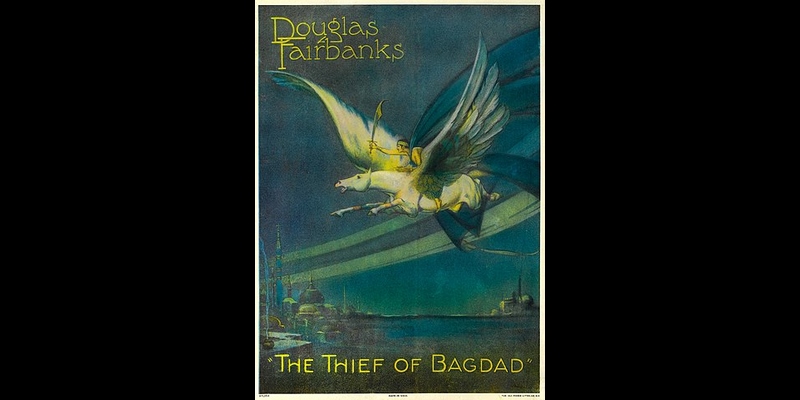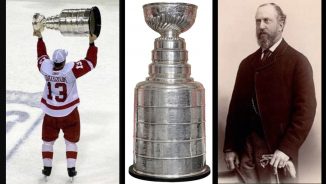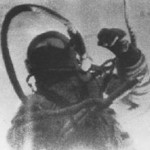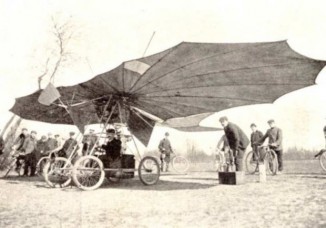100 years ago today, the classic silent film The Thief of Baghdad, written by and starring Douglas Fairbanks, debuted in cinemas. Freely adapted from stories within One Thousand and One Nights, it tells the story of a thief who falls in love with the daughter of the Caliph of Baghdad. In 1996, the film was selected for preservation in the United States National Film Registry by the Library of Congress as being “culturally, historically, or aesthetically significant”. WATCH the trailer of the remastered edition… (1924)

Described by his biographer as the “greatest artistic triumph of Fairbanks’s career,” the film involved a cast of literally thousands of people, and top special effects of the era to portray fearsome monsters and flying carpets. Huge Arabian-style sets where Fairbanks’ catlike gymnastics could be utilized in jumping and running across rooftops.
MORE Good News on this Date:
- Frank Sinatra made his first recording, a song called ‘Our Love’, with the Frank Mane band (1939)
- Singer-songwriter Wilson Pickett, whose best-known hits are ‘In the Midnight Hour’ (which he co-wrote), and ‘Mustang Sally’, was born (1941)
- South Africa voted for political reforms to end apartheid (1992)
- The first-ever Muslim Friday prayer led by a woman (in a mixed-gender New York mosque) marked a break with a 1426-year Islamic tradition (2005)
24 years ago, English Rugby won the inaugural Six Nations Championship after thrashing Italy 59-12 at the Stadio Flaminio in Rome. Known sometimes (and correctly) as the best tournament in sport, Six Nations grew out of the Home Nations Championship, first played in 1883 and involving only England, Ireland, Scotland, and Wales. France were invited in 1910, and Italy joined in the fun in the year 2000.
England clinched the first title and has gone on to win the most since the turn of the millennium, followed by Wales. The tournament is filled with inside references and fanfare based on the historical geo-political rivalry between the participating nations.

The tournament is incredibly simple; each team plays each other one time. 2 points are awarded for winning a march, and 1 for drawing. Whoever has the most points at the end of the five matches wins. The “Grand Slam” is awarded if a team wins all five matches. The “Triple Crown” is awarded on the occasion that a Home Nation (England, Scotland, etc.) beats all three of their neighbors. The “Wooden Spoon” is awarded to the team that loses all five of their matches.
There are also individual rivalries that take place, which can award a team a trophy. The winner of England vs Scotland takes home the “Calcutta Cup” which is made from melted down rupees, while the winner of France vs Italy takes home the “Garibaldi Trophy” which commemorated the 200th birthday of the founder of the modern Italian nation who also fought in the French army against Prussia.
There’s never a dull moment in Six Nations, and it creates a unique history among the countries. For example, the Scottish National Anthem is not played during Six Nations games, but rather the “Flower of Scotland.” Scottish winger Billy Steele encouraged his teammates to sing it during a visit of the Home Nations Championship to South Africa in 1974, and in 1990 it was played during the Five Nations tournament for the first time. Scotland won the Grand Slam that year, including a blockbuster final match against England. WATCH the 5 best on-field moments in the tournament’s history… (2000)
362 years ago today, the first public transportation service in the world began in Paris. Described as “carriages which would always make the same journeys…and would always leave at scheduled times,” the Carosses a Cinq Sous (five-cent coaches) were pulled by four horses, staffed by a driver and valet, at a cost of five sol.

The service was developed, promoted, and organized by the mathematician and philosopher Blaise Pascal. With five routes linking multiple Historical quarters of Paris, the new service was met with a positive reception by the general public. (1662)
And, 131 years ago today, Lord Stanley pledged to donate a silver cup to the best Canadian hockey team, establishing the Stanley Cup.

The oldest existing trophy awarded to a professional sports franchise, it is given to the National Hockey League playoff winner each year. The original was a bowl made of silver, a copy of which now adorns the top of the current Stanley Cup, a huge 35-pound piece of silver and nickel alloy 35 inches high. Unlike the trophies awarded by the other major professional sports leagues, a new Stanley Cup is not made each year—it is passed between the former and new champions. (1893)
34 years ago today, a 4400-year-old mummy, one of the oldest ever found in Egypt, was unearthed in a shallow pit at the foot of the Great Pyramid of Cheops.

The young woman, her smile frozen in time, surprised Egyptologists because the Giza pyramids area has repeatedly been looted since antiquity and excavated by some of the greatest archeologists of the last two centuries. The grave (likely for a princess) was still sealed when an antiquities inspector accidentally found the burial shaft. Adorning the mummy was a bronze crown covered with gold leaf and jewelry around the neck. (1989)
And, 59 years ago today, Alexei Leonov became the first human to float in space, exiting his Soviet capsule, the Voskhod 2, for a 12-minute spacewalk.

He almost did not make it back through the door after his suit unexpectedly inflated and stiffened, but boldly let out some of the air in his suit and forcibly squeezed back through the small entrance to safety. Welcomed back as a hero, Leonov completed man’s first spacewalk just ten weeks before the Americans.
A decade later in 1975 Leonov commanded the Soyuz 19 in the first joint space mission between the Soviet Union and the United States, the Apollo-Soyuz Test Project, which marked the end of the Space Race between the two nations, a symbol of détente, a policy which both governments were pursuing at the time. (1965)
And 118 years ago today, Romanian inventor and aviation pioneer Traian Vuia succeeded in the first flight of a self-propelled heavier-than-air aircraft. 
He was the first to demonstrate that a flying apparatus could rise into the air by running on wheels upon an ordinary road. His monoplane is credited with a powered hop of 11 meters/36 feet. Though unsuccessful in sustained flight, the invention influenced Louis Blériot in building monoplanes. Later, Vuia also designed helicopters.
“I have never sought for glory, as I know that glory often makes a man lose himself,” said Vuia. “I do not work for my own personal glory, but for the glory of the human genius. What difference does it make, who did these things?…Really important is that they exist.” (1906)
Also, Happy 54th Birthday to Queen Latifah, the actress, rapper, singer-songwriter, and producer who was born ‘Dana Owens’ in Newark, New Jersey.

Her 1989 debut album All Hail the Queen featured the hit single Ladies First—but her third album, Black Reign, spawned the Grammy-winning single, U.N.I.T.Y., which became an influential anthem for women.
The actress gained success in her Oscar-nominated performance in the film Chicago. And in 2013, she made herself a daytime talk host with The Queen Latifah Show. Her films include, Bringing Down the House, Taxi, Beauty Shop, Last Holiday, Hairspray, Joyful Noise, Mad Money, Stranger than Fiction, The Secret Life of Bees, and 22 Jump Street. She also received critical acclaim for her portrayal of blues singer Bessie Smith in the 2015 HBO film Bessie, which she co-produced. It won her an Emmy Award for Outstanding Television Movie. WATCH her perform U.N.I.T.Y. at the 2014 Nobel Peace Prize ceremony for Malala… (1970)
Share the Milestones, Memories, and Music…




















[…] post Good News in History, March 18 appeared first on Good News […]
[…] syndMarch 19, 2018GoodNewsGoodNews […]
[…] Source: Good News Network […]